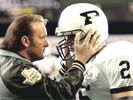Eye For Film >> Movies >> Friday Night Lights (2004) Film Review
The opening shot of Friday Night Lights takes us inside an old-fashioned kitchen filled with the dusty, golden light of the West Texas desert. At a rough wooden table sits Mike Winchell (Lucas Black), quarterback for the renowned Permian Panthers, wolfing cereal while his mother drills him repeatedly from a book propped in front of her. The scene has a life-or-death intensity, which seems odd until we realise she's reading from Mike's playbook.
In a series of intimate, perfectly wrought scenes like this, director Peter Berg draws us remorselessly into the dying town of Odessa and a community obsessed with its high school football team. "There's only one subject, and that's football!" yells star running back Boobie Miles (Derek Luke) to a reporter quizzing him on his grades. Boobie doesn't read very well, but he can read the sign on the locker-room wall: "Whatever it Takes." The sentiment resonates with teammate Don Billingsley (Garrett Hedlund), struggling to please his abusive father (an astounding performance from country singer Tim McGraw), whose own glory days are far behind him. "You got one year to make yourself some memories," he sneers at his son after a particularly bad fumble. "One stinkin' year."

That year is 1988, and Permian is embarking on a tumultuous path to the state championship. Based on journalist Buzz Bissinger's bestseller, Friday Night Lights is one of those rare sports movies that places the seductive cruelties of the game front and center, neither elevating nor excusing them. The film shows us a sport that's loved but never fetishised, and Berg, using a handheld camera and harsh close-ups throughout, drags us through the shoulder slams and gut punches, the torn cartilage and bloody skin with exhilarating realism. "At some point you gotta worry about the safety of the kids," an assistant coach protests weakly. No one listens.
For the players themselves, football is their get-out-of-jail card; even their girlfriends are frantic with the scent of a better life ("Give me one touchdown, just one!"). As a nonstop radio discussion of the season plays insistently in the background, Berg brilliantly evokes the kind of relentless pressure no 17-year-old should ever feel. "Get it done," the sheriff warns Coach Gaines (a beautifully restrained Billy Bob Thornton). "Or what?" asks Gaines, and the question hovers over the film, a sword waiting to fall. In a town where every other hand displays a championship ring and futures can evaporate in the flash of an X-ray, losing is simply not an option.
For most of the film, Berg keeps us on the field, or in the locker room, but occasionally detours through town past the rhythmically pumping oil wells and pointedly displayed For Sale signs, dumped on Coach Gaines' lawn after a losing game. Like the belching Pennsylvania steel mills of All The Right Moves, or the rolling Indiana fields of Hoosiers, Odessa's arid decline is a tangible force, embedded in the DNA of everyone who lives there. And as its streets empty out for the climactic game against Dallas Carter, it's easy to imagine the ghost town of the future.
Friday Night Lights may catch some flack for its depiction of the Dallas team as an all-black army of 300-pound thugs (even if it's an accurate one), and for the inclusion of some standard sports movie cliches, like the third-string running back who gets his chance to shine, or the silent giant who finds his voice in a crisis. But the wood here is so much more interesting than the trees and Friday Night Lights never wavers in its commitment to that perfect, quintessentially American moment when heartbreak and joy, despair and transcendence can merge in a single, magnificent play.
For that one moment, it's enough.
Reviewed on: 16 May 2005


















